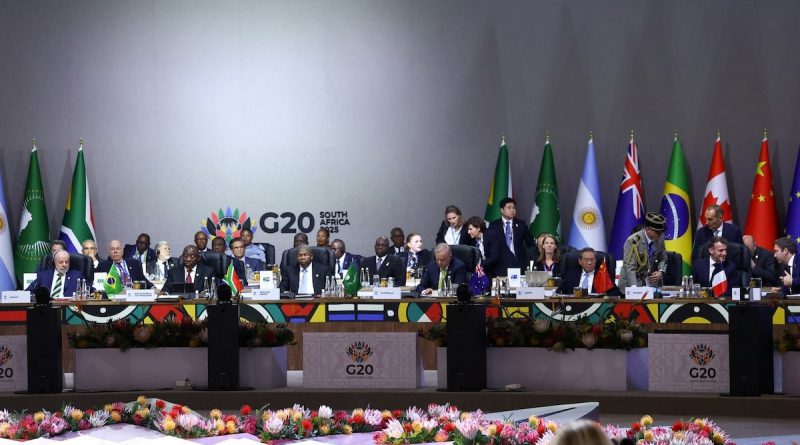G20 Summit in South Africa Adopts Declaration Despite U.S. Boycott and Rising Tensions
Johannesburg — The G20 summit hosted in South Africa concluded its latest round of discussions with the adoption of a joint declaration focused on climate challenges, global economic pressures, and development issues, even as the United States chose to boycott the gathering.
The declaration was finalized without U.S. participation, highlighting widening diplomatic divisions among major economies.
South African officials stated that the document could not be reopened for renegotiation, underscoring the firm position taken by the host nation after months of preparatory work.
They described the final week leading up to the summit as particularly intense, with negotiations involving numerous delegations to build consensus.
President Cyril Ramaphosa emphasized that the vast majority of participating nations supported the declaration’s adoption.
He said that despite the absence of the U.S., delegates had worked in good faith to reach an outcome that reflected shared objectives, especially on climate initiatives.
Diplomats familiar with the drafting process noted that the declaration contained language that Washington has long opposed.
It includes strong references to the urgency of addressing climate change, adapting to environmental risks, promoting renewable energy expansion, and easing the debt burdens of low-income nations.
These themes represent priorities championed by several developing countries and global institutions that have urged wealthier economies to contribute more significantly to climate resilience efforts.
The inclusion of such language marked a clear departure from the positions held by the U.S. administration, which has resisted references to climate commitments.
The absence of the United States was closely tied to political disagreements with South Africa’s government.
U.S. officials argued that they would not attend due to allegations of discrimination against the white minority in South Africa, claims that have been widely disputed by independent observers.
The boycott created a distinctive backdrop to the summit, which was intended to highlight Africa’s growing role in multilateral diplomacy.
Nevertheless, South Africa stressed that it would not allow external disputes to overshadow the significance of the continent’s first G20 presidency.
In his opening remarks, President Ramaphosa reiterated the importance of unity among G20 members in confronting shared global challenges.
He stated that adopting the declaration early in the summit would send a strong message of cooperation and determination.
He also urged participants not to diminish the symbolic value of Africa hosting the summit for the first time.
The leadership role, he said, reflected the continent’s evolving position in global governance discussions.
The U.S. decision to skip the event added strain to already complex relationships between Washington and Pretoria.
It also raised questions about how the transition of the G20 presidency to the United States next year would unfold.
South African officials indicated that they would hand over the presidency to an empty seat due to the boycott, rejecting the offer for a lower-level diplomatic representative to stand in.
This symbolic moment highlighted the diplomatic gap that has widened in recent weeks.
Despite geopolitical tensions, the broader group of G20 nations continued discussions on issues such as energy transitions, debt restructuring, global trade pressures, and strengthening resilience against future climate-related crises.
Several leaders looked to the summit as an opportunity to reinforce multilateral cooperation at a time of increasing global uncertainty.
Participants from emerging economies emphasized how rising debt payments have strained public budgets and hindered development planning.
They welcomed the references in the declaration that acknowledge these challenges and call for enhanced international support mechanisms.
The focus on renewable energy targets also drew significant attention, with many leaders expressing the need for accelerated progress.
The document encourages partners to scale up investments in clean technologies to support long-term sustainability.
As the summit concluded, South Africa reaffirmed that its presidency aimed to strengthen collaboration between developed and developing countries.
Officials maintained that the adoption of the declaration, despite the absence of one major member, showed the continued relevance of the G20 as a global platform.
The coming year will determine how the handover to the next host unfolds and whether diplomatic tensions will influence future agendas.
For now, the South African presidency has underscored its commitment to a cooperative approach, hoping the decisions made in Johannesburg will contribute to broader global stability.



